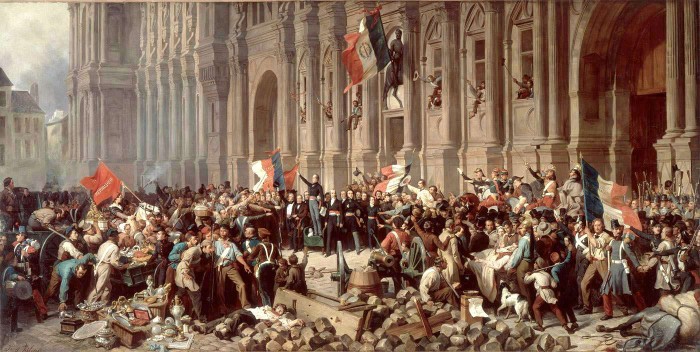

Revolutions are these resistances prompted by people of certain country against dictatorships or occupations. They are intended to change this sort of oppression, through various actions. Some countries managed to achieve their demands, and others did not. From another point of view, revolutions are double-edged weapons, as since they are designed for seeking freedom, sometimes freedom without responsibility leads to chaos. Thus, if you are interested in revolutions, check out this article, that includes the most famous ones.
10 The French revolution:
It emerged in 1789, it greatly impacted both the French and modern history, aiming the overthrowing of authoritative monarchies and churches then the foundation of the democratic and nationalistic rule. Finally, it led to the execution of Louis XVI. It was a battle between the rich and the poor, as the French society at that time suffered a deep gap between the high class and the low class, lacking a middle one. For the literary adaptations, it is highlighted in a novel called “A Tale of Two Cities” by Charles Dickens.
9 Kościuszko Uprising:
It was an uprising set against the Imperial Russia and the Kingdom of Prussia, it was led by Tadeusz Kościuszko in the Commonwealth of Poland in 1794. Seeking well-armed protests and Polish forces, Kościuszko issued an act of recruitment that demands that every 5 houses in Lesser Poland shall elect at least one talented male soldier prepared with carbine or an axe. After the breakdown of the Kościuszko Uprising, the state stopped to exist for 123 years and all of its organizations were slowly but surely disqualified by the partitioning powers.
8 Revolutions of 1848 in the German states:
It is called the March Revolution, they were a sequence of with a loose knot in step protests and revolutions in the states of the German Confederation, together with the Austrian Empire. The middle-class was faithful to liberal principles, at the same time as the working class wanted deep-seated improvements to their living conditions.
7 Boxer Rebellion:
It was a brutal Christophobic movement which happened in China between1898 and 1900, aiming to end of the Qing dynasty. International anxiety and domestic conflict stimulated the extension of the Boxer movement. A drought tracked by floods in Shandong province in years 1897–1898 enforced farmers to escape to cities. As an aftermath, Beijing, Tianjin, and others in northern China were occupied by the worldwide expeditionary power led by the German General Alfred Graf von Waldersee.
6 The American Revolution:
It was a political disorder that happened between 1765 and 1783. The American Revolution emerged because of social, political, and intellectual changes in American society. In 1765, the Americans opposed the authority of the British Parliament to impose taxes on them, seeking independence.
5 The Algerian Revolution:
It took place against the French colonization, seeking independence. In 1961, President Charles de Gaulle made his mind up to surrender Algeria, despite being an integral part of France, following carrying out a referendum that indicated a massive support for the Algerian independence.
4 The Egyptian Revolution of 1952:
It took place on July 23rd 1952, under the command of the Free Officers Movement, who is a group of army officers guided by both Muhammad Naguib and Gamal Abdel Nasser, later two subsequent Egyptian Presidents. It emerged to end the monarchy in Egypt and the British occupation. The revolution also aimed to found a powerful army and spread justice.
3 Anyanya Rebellion:
It is most likely described as a civil war waged between the northern and southern parts of the Sudan. About five hundred thousand people were killed and hundreds of thousands more were displaced. The Addis Ababa Agreement showed to be only momentary break. Breaches by the north part led to greater than before conflict in the south taking place in the mid-1970s, causing the 1983 army revolt that flashed the Second Sudanese Civil War.
2 14 July Revolution:
It occurred on 14 July 1958 in Iraq, to overthrow the Hashemite kingdom established by King Faisal I in 1921 by the British. King Faisal II, the regent as well as Crown Prince ‘Abd al-Ilah, and Prime Minister Nuri al-Said were all eliminated during this coup. In 1959, the state of affairs in Iraq was originally puzzled and unbalanced, having opponent groups disputing, for the sake of control.
1 Tunisian Revolution:
It started on 18 December 2010 and led to the throwing out President Zine El Abidine Ben Ali in January 2011.the revolution was fueled by high rate of unemployment, corruption, lack of freedom of opinion. It was the flaming match that sparked the entire Arab region, leading to the rest of revolutions, entitled The Arab Spring that took place in Egypt, Yemen, Syria, and others.
As shown, revolutions are not always pieces of heaven, but sometimes are pieces of hell.